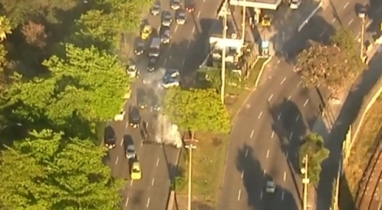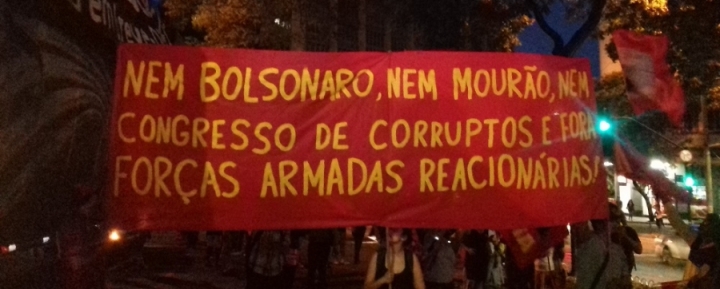Photo: The Popular Revolutionary Student Movement (MEPR) raises a banner reading “Defend Education Tooth and Nail!” in Rio de Janeiro during the National Education Strike
By Jakob Stein
Starting on October 2, Brazilian students and workers participated in a massive two-day National Education Strike against the reactionary policies of fascist President Jair Bolsonaro, who has set out to privatize public education as well as dismantle the national pension system.
The main target of the strike was the “Future-se” (“Join the Future”) program, which is intended to increase private investment in federal public universities and make them responsible for their own financial survival. The program is built around three component parts, management and entrepreneurship, research and innovation, and internationalization.
Each component includes various policy changes, but they are all aimed at the same goal: bringing private capital into public education and transforming education from a social resource into a service for the Brazilian economy and by extension, US imperialism. The attempt to increase private funding paired with divestment of public funds in education is aimed at privatizing federal institutes and universities to stave off the inevitable crises of bureaucratic capitalism.

The strike was accompanied by demonstrations and other actions in major cities around the country. In Rio de Janeiro, a barricade of burning tires was ignited on a major road in the north part of the city, bordering the State University of Rio de Janeiro (UERJ). Next to the barricade was a red banner with the popular slogans, “Neither Bolsonaro nor Mourão! Out with the reactionary military!” and “Defend education tooth and nail!”
Large protests blocked major roadways in several cities including São Paulo, Campinas, Salvador, and Maceió among others. In Belo Horizonte the Construction Workers Union (Marreta), the Class Movement of Education Workers (Moclate), the Popular Struggle for Socialism (LPS), the Workers League, and the Popular Revolutionary Student Movement (MEPR) led a combative bloc which sharpened the tone of the popular demands. In the nation’s capital Brasilia, students and teachers occupied six different campuses of the Federal Institute of Brasilia (IFB). Student protesters in Florianópolis blocked the entrance of the Federal University of Santa Catarina (UFSC) with a blockade made of pieces of wood, trashcans, bicycles, and other objects.


Workers, especially those working in the field of education, have also raised the issue of the proposed “pension reform” which would make retirement more difficult and costly for workers by increasing the retirement age and increasing worker contributions. Financial analysts from the US have commented that a failure to pass Bolsonaro’s “reform” could prompt a massive sell-off from international investors and a possible downgrade in Brazil’s credit rating. The zeal with which the reactionary old state is pushing to dismantle the national pension system is indicative of their role as lackeys of US imperialism and international finance capital.
As the crisis of bureaucratic capitalism in Brazil deepens and the reactionary old state decays, the government will continue pushing austerity measures aimed at satisfying the whims of imperialism (at this time US imperialism) and stripping the masses of any and all gains that have been achieved in the hard-fought class struggle. As long as the mountains of imperialism, semifeudalism, and bureaucratic capitalism weigh on the backs of the people, they will be subject to abuse and hunger, which is why the popular movements of workers, peasants, students, women, and indigenous people are struggling for the New Democratic Revolution.

